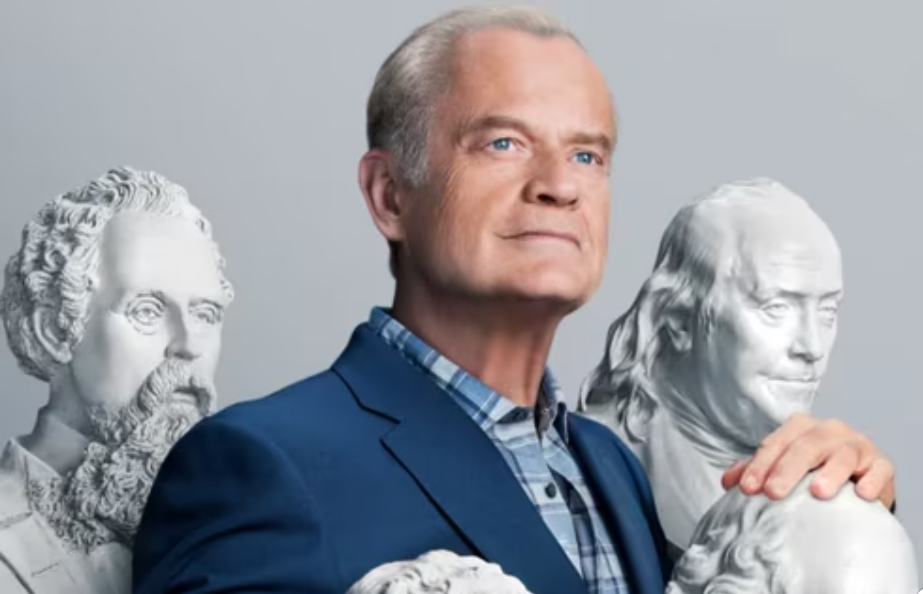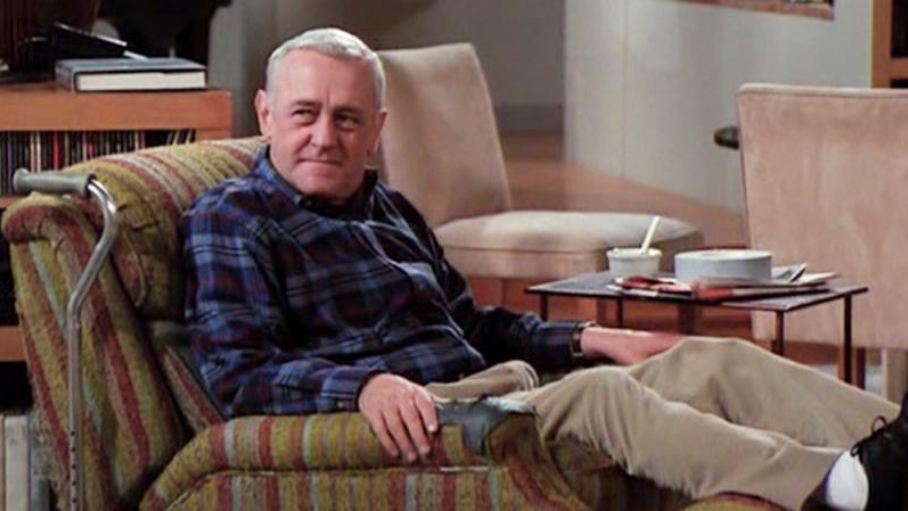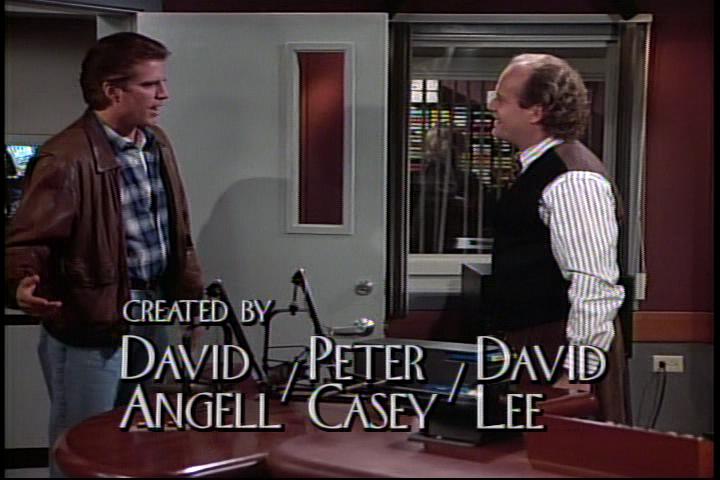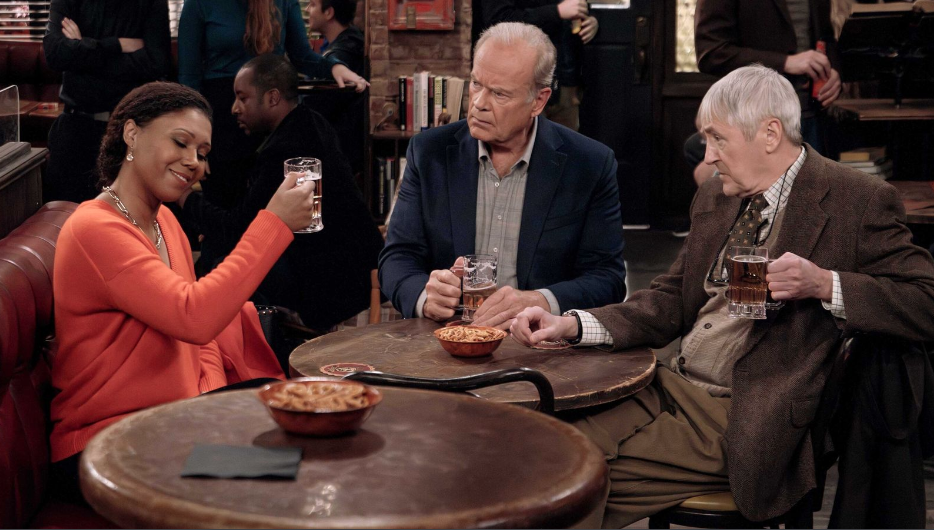Tossed Salads and Scrambled Characters - Frasier Reboot Review
Maybe some stories really are best left alone.

A couple of weeks ago, in my piece The Curse of Reboot Cringe I made some predictions about the new reboot of Frasier: “There’s a chance, however slim, that it’ll be ten episodes of fun, interesting stories about a character we know and love in a new (old) city. My doom and gloom prophecy is that it will be crammed full of hacky dialogue and confusion about the youth of today.” The first two episodes of Frasier dropped on Paramount+ this week and thankfully I wasn’t entirely right. My direst predictions involved pronouns and the musical Hamilton, and so far neither of those have been used as punchlines. Yet. There are still eight episodes to go.
Realistically, though, the new Frasier is disappointing from the start. The first two episodes aren’t exactly fun, interesting stories about a character we know and love in a new (old) city. In fact, the new/old city is one of the biggest failings of the show so far. The character of Dr. Frasier Crane originated in the Boston sports bar setting of Cheers, back in the eighties, before spinning off into his own Seattle-based show. (For the full history of how Frasier became Frasier, see my upcoming book Friends and the Golden Age of the Sitcom. No, it’s not available for pre-order anywhere yet. Yes, I’m still plugging it.) The new Frasier seems determined to ignore its roots, placing Frasier’s connection to Boston purely in the halls of Harvard university and the apartment of his estranged son. The sports bar, one of the most iconic sitcom locations of all time, is a distant piece of history brushed under the rug in a single line. A storyline in the second episode about Frasier not understanding the importance of a box of dirt from Fenway Park - a prized possession of his son’s - has the character arrogantly unaware of the world of Boston sports, considering it obviously beneath him. Would that be true of a character who counted Ted Danson’s ex-pro baseball player Sam Mahoney as one of his closest friends?
When I call Frasier disappointing from the start, it’s not hyperbole. But the opening scene has its moments, at least. There’s something comforting in hearing the audience cheer as Kelsey Grammer enters. Multi-camera sitcoms shot in front of a live studio audience feel quaint these days, but after spending a year writing about the sitcoms of the nineties I’m quite attached to them, when they’re done right. For all its faults Frasier is, in that sense, done right. James Burrows, the television legend who co-created Cheers and has directed well over a thousand episodes of sitcoms since he started out on The Mary Tyler Moore show in the seventies, was in the director's chair for all ten episodes of Frasier, and so far it shows. Frasier is shot as well as a classic-style sitcom could possibly be.
Other names long attached to both Cheers and Frasier are notably absent. It’s well-known that David Hyde Pierce (Niles) and Jane Leeves (Daphne) opted not to be a part of the reboot, and sadly John Mahoney (who played Frasier’s down-to-earth father Martin) passed away in 2018. In the final credits of the episode, there’s an “in loving memory” for Mahoney, featuring a shot from the original Frasier set of him, in Martin’s battered recliner, telling the camera and therefore the audience that “it all works out.” There’s also a mention, in the memory cards, of Gabrielle James (the incredibly script supervisor who worked on hundreds of episodes of both Cheers and Frasier) and Archie Lyndhurst, Nicholas Lyndhurst’s son, both of whom passed away in the last few years.

The show itself seems to be trying to pay tribute to Martin Crane by making Freddy, Frasier’s son, in the image of his recently deceased grandfather. Freddy is a hardworking, blue-collar firefighter with little interest in the finer things in life and even less in common with his father. Unfortunately, the attempt to echo Frasier’s relationship with his own father falls flat. The brief mention of Martin’s funeral in the opening minutes of the episode gets quickly passed over for a torrent of expositional dialogue about what Frasier’s been up to since his show ended in 2004. The reboot tries to dive deeper into Frasier and Freddy’s relationship, and their reaction to Martin’s passing, but where the original Frasier made room for real emotions amidst the comedy, this new version just thuds the feelings down for a second then runs away. Some of this is down to the length of the season. The original Frasier aired at a time when twentyish-episode sitcom seasons were the norm. Those long seasons meant that Frasier’s relationship with his father could move at a natural pace from mutual antagonism into something more affectionate. With only ten episodes, the Frasier reboot just doesn’t have time - it resolves emotional conflicts quickly, wraps up the episode and then rehashes them all over again in the following half-hour. Somehow it manages to be stagnant and too quick all at once.
The second episode reveals that Freddy has lied to his fellow firefighters - telling them that his father is dead rather than admitting to being the son of famous shrink Dr. Frasier Crane. It can be a nice bit of detail when reboots, sequels and spin-offs echo the stories of the shows they came from. In the original Cheers, Frasier tells his friends, including Sam Malone, that his father is dead. When Sam visited Seattle for a brief sweeps week stunt in Frasier’s second season, the inconsistency was handled in a single scene. It was never meant to be part of a bigger emotional storyline, it was just that - an inconsistency borne out of a throwaway moment in an original show from a character whose spin-off wasn’t yet a twinkle in the network’s eye. In the new Frasier, it’s a drawn-out emotional scene that sits at odds with the rest of the show’s tone. (While the show doesn’t reference Hamilton, it does squeeze in a Mama Mia! bit.) The echoed storyline could have been a nice touch, but it doesn’t work in a show that seems to ignore everything that came before.

When sitcoms run for too long, characters tend to fall apart into parodies of themselves - the Phoebe-from-Friends problem. The original Frasier managed to deftly avoid the problem in its original eleven-year run, but the reboot’s making up for that in spades. In the first two episodes, Kelsey Grammer’s new Frasier Crane is painfully fastidious, prissy and overly perfectionist. Frasier has always been a character that preferred the finer things in life, but in the new show his care for his Lacroix cushions seems like a joke put in to replace any actual personality. In an early scene in the new show’s new bar (named Mahoney’s, for John Mahoney), Frasier monologues about drinking beer and feeling “amalgamated with the hoi polloi”. This is Frasier dialogue as written by an A.I. that’s been fed a single episode of the show and an oversized thesaurus.
The new characters in the show are, by comparison, a delight. While Freddy falls a bit flat, his roommate Eve (played by Jess Salgueiro) practically leaps off the screen with energy. Nicholas Lyndhurst, when he’s not delivering exposition, manages to be genuinely dryly funny. It’s clear that he’s playing to his fellow actors, not the live audience watching, and somehow it really works. His antagonistic back-and-forth with Toks Olagundoye’s Olivia are some of the funniest moments of the first two episodes, and give me hope that there might be a good show buried in here somewhere. By contrast Niles and Daphne’s son David, played by Anders Keith, feels like a lazy bit of comic relief. The writing and his performance are conspiring to deliver a David Hyde Pierce impression that remembers only the worst parts of the original character. Niles and Frasier were so fun to watch together because they played off each other beautifully, in a relationship of equals. Making the Niles stand-in Frasier’s fan-boy nephew creates a power imbalance that makes David the butt of the joke, and makes the comedy feel cruel.

David came into the world in the original Frasier finale, a fantastically chaotic two-parter that featured guest turns from Robbie Coltrane and Richard E. Grant. Niles and Daphne’s son was named for David Angell, who along with Peter Casey and David Lee, co-created and oversaw the original Frasier until he passed away in 2001 during the 9/11 terrorist attacks. Those three names: Casey, Angell and Lee are nowhere to be seen in this new Frasier, even in the “in loving memory” card. That might account for the lack of quality and consistency.
This all begs the question - who is this reboot for? Thankfully, as reboots go, the cringe isn’t front and centre. Apart from an extended “baby shark” bit that had me wondering if the writers actively hate their audience, the Frasier reboot is blessedly free of tired jokes that forcefully remind the audience that the show is happening Right Now. For long-time fans of Cheers and Frasier though, this new show is unappealing, lacking all the charm and grace of the shows that came before. The nods to the show’s history, like Frasier spotting the phrase “Are you listening?” on a sign in the airport (a callback to his “I’m listening” catchphrase) and wryly chuckling while almost winking at the camera, are so clumsily pointed up that there’s no room to enjoy them. For new viewers, is there honestly much appeal in a multi-cam sitcom about an ageing Kelsey Grammer? I found the new performance of “Tossed Salads and Scrambled Eggs” over the credits charming, but would I if I had absolutely no connection to the original show?
I’m aware it sounds like I hate the show with a burning passion. I don’t, yet. It’s a perfectly fine sitcom, it has potential, and if it can get over its opening exposition hurdles and stay away from the curse of reboot cringe, then the next episodes might be fun. Even if they aren’t, I’ll watch them - I’m a glutton for punishment. Dr Frasier Crane will never lose his sense of self-importance - it’s what makes the character. But hopefully, in the next eight episodes, Frasier can get over itself and out of its own way.
Thanks for reading Two-Hats Television! Subscribe for free to receive new posts and support my work.




